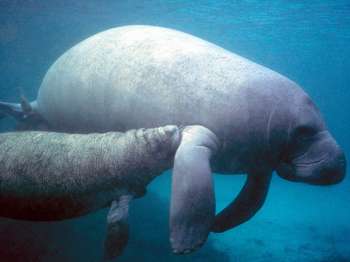Last updated: April 9, 2021
Place
West Indian Manatee

Information
The West Indian Manatee, the type of manatee found in Florida, is a member of the Dugong family which includes only five species--the West Indian, the Amazonian, and the West African Manatees, the Dugong of east Africa and the East Indies, and the extinct Steller's Sea Cow. In fact, most members of this family are slowing edging towards extinction.
Several reasons for their decline include a high mortality rate, especially human-influenced (by motor boats, hunting, and discarded fishing line and plastic), low reproductive rates (a female has only one calf every 4-5 years), and the loss of habitat (people move to Florida at the rate of nearly 800 per day, and most settle along the coasts). It is estimated that only about 2500 Manatees are left in Florida.
And these are remarkable animals. A full-sized adult has an average length of nearly 10 feet (3 meters) and weighs from 800-1200 pounds (363-545 kg)--all on a diet of plants! They spend six to eight hours a day grazing on sea grasses and emergent plants like hydrilla and water lettuce in shallow water near the coast or in warm rivers.
Manatees move through the water primarily by the pumping action of their flat tails. The front flippers are used for steering and lateral movement, for crawling over the bottom and even for helping put food into their mouths. If you look closely, you may even see four toenails on each flipper.
They rest submerged just below the surface which makes them very vulnerable to being hit by motor boats. It is a rare manatee that does not show propeller scars on its back. At rest a manatee might stay submerged for as long as twenty minutes, although when feeding or moving, this time will be much shorter.
Manatees are social creatures and are often found in groups. Females will often act as "aunts", helping take care of another's calf. They are also playful and curious and will surface near a boat or dock to look at the people. Remember, though, that Manatees are wild animals. Not only is it against the law to harass or feed a manatee, but these can interrupt the manatee's natural behavior.
Do you know what land mammal is the closest relative of the manatee?
